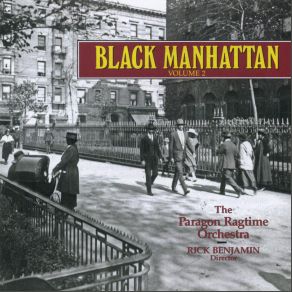Black Manhattan, Vol. 2
Download links and information about Black Manhattan, Vol. 2 by Paragon Ragtime Orchestra, Rick Benjamin. This album was released in 2012 and it belongs to Jazz genres. It contains 19 tracks with total duration of 01:11:20 minutes.

|
|
|---|---|
| Artist: | Paragon Ragtime Orchestra, Rick Benjamin |
| Release date: | 2012 |
| Genre: | Jazz |
| Tracks: | 19 |
| Duration: | 01:11:20 |
| Buy it NOW at: | |
| Buy on iTunes $9.99 | |
| Buy on Amazon $8.99 | |
Tracks
[Edit]| No. | Title | Length |
|---|---|---|
| 1. | Shuffle Along Overture | 6:31 |
| 2. | Nobody (featuring Edward Pleasant) | 4:55 |
| 3. | That’s Got ’Em—Rag | 2:29 |
| 4. | Honey Lamb (featuring Anita Johnson) | 3:29 |
| 5. | Brazilian Dreams | 4:00 |
| 6. | Down in Honky Tonky Town | 2:08 |
| 7. | Returned: A Negro Ballad (featuring Anita Johnson) | 6:27 |
| 8. | The Bell Hop Rag | 3:31 |
| 9. | Black Patti Waltzes | 6:18 |
| 10. | Goodnight Angeline (featuring Robert Mack) | 3:09 |
| 11. | The Castle Walk | 2:46 |
| 12. | Aunt Hagar’s Children Blues (featuring Linda Thompson Williams) | 2:40 |
| 13. | Valse Angelique | 3:56 |
| 14. | At the Ball, That's All (featuring Edward Pleasant) | 2:38 |
| 15. | When the Moon Shines (featuring Anita Johnson) | 3:53 |
| 16. | Oh! You Devil | 3:36 |
| 17. | Breath of Autumn | 3:39 |
| 18. | Pine Apple Rag Song (featuring Anita Johnson) | 2:50 |
| 19. | Fizz Water | 2:25 |
Details
[Edit]Black Manhattan was the title of essayist James Weldon Johnson's sketch of the African-American intelligentsia in Manhattan between the world wars. This release, the second of a pair, explores the music they would have heard there, especially in the 1910s decade. For general listeners, the chief attraction is the chance to hear ragtime as an audience of that time and place would have understood it. The rediscovery of ragtime through its greatest exponent, Scott Joplin, has tended to obscure the fact that for most listeners, at least in New York, it was an ensemble music and often a vocal one. Joplin appears only once here, with the Pine Apple Rag Song (track 18), which consists of his famous Pineapple Rag with an added and not terribly effective text. But that was the only way New York publishers would accept it. Most of the program consists of pieces by lesser-known composers for an ensemble of winds, strings, and percussion; some are rags, but several are waltzes, and the tango makes an appearance. There are some small gems here, such as the finale, Eubie Blake's Fizz Water, with its delightful treatment of the emerging blue note. What was then called the blues makes only one appearance, with W.C. Handy's Aunt Hagar's Children's Blues, and conductor and annotator Rick Benjamin correctly notes that for a New York audience of the time, it would have been quite a shock. Vocalist Linda Thompson Williams puts that shock across effectively, and really on the seven vocal piece the singers are uniformly good. The blackface idiom of the most famous piece on the album, Bert Williams' Nobody, is very difficult to adapt for a modern audience, but baritone Edward Pleasant catches the song's layers of pain and finds his way effectively between ignoring and overemphasizing its dialect treatment. Both informative and entertaining, this is a strong entry in the still neglected field of pre-jazz, African-American music., Rovi